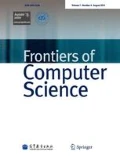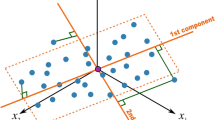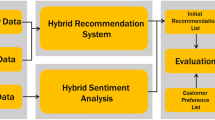Abstract
Personal profile information on social media like LinkedIn.com and Facebook.com is at the core of many interesting applications, such as talent recommendation and contextual advertising. However, personal profiles usually lack consistent organization confronted with the large amount of available information. Therefore, it is always a challenge for people to quickly find desired information from them. In this paper, we address the task of personal profile summarization by leveraging both textual information and social connection information in social networks from both unsupervised and supervised learning paradigms. Here, using social connection information is motivated by the intuition that people with similar academic, business or social background (e.g., comajor, co-university, and co-corporation) tend to have similar experiences and should have similar summaries. For unsupervised learning, we propose a collective ranking approach, called SocialRank, to combine textual information in an individual profile and social context information from relevant profiles in generating a personal profile summary. For supervised learning, we propose a collective factor graph model, called CoFG, to summarize personal profiles with local textual attribute functions and social connection factors. Extensive evaluation on a large dataset from LinkedIn.com demonstrates the usefulness of social connection information in personal profile summarization and the effectiveness of our proposed unsupervised and supervised learning approaches.
Similar content being viewed by others
References
Lappas T, Punera K, Sarlos T. Mining tags using social endorsement networks. In: Proceedings of the International ACM SIGIR Conference on Research and Development in Information Retrieval. 2011, 195–204
Tan C, Lee L, Tang J, Jiang L, Zhou M, Li P. User-level sentiment analysis incorporating social networks. In: Proceedings of the ACM SIGKDD International Conference on Knowledge Discovery and Data Mining. 2011, 1397–1405
Yang S H, Long B, Smola A, Sadagopan N, Zheng Z H, Zha H Y. Like like alike: joint friendship and interest propagation in social networks. In: Proceedings of the International Conference on World Wide Web. 2011, 537–546
Guy I, Zwerdling N, Ronen I, Carmel D, Uziel E. Social media recommendation based on people and tags. In: Proceedings of the 33rd International ACM SIGIR Conference on Research and Development in Information Retrieval. 2010, 194–201
Wan X J, and Yang J W. Multi-document summarization using clusterbased link analysis. In: Proceedings of the 31st International ACM SIGIR Conference on Research and Development in Information Retrieval. 2008, 299–306
Wan X J. Using bilingual information for cross-language document summarization. In: Proceedings of the 49th Annual Meeting of the Association for Computational Linguistics. 2011, 1546–1555
Radev D R, Jing H Y, Stys M, Tam D. Centroid-based summarization of multiple documents. Information Processing and Management, 2004, 40(6): 919–938
Radev D R, McKeown K R. Generating natural language summaries from multiple on-line sources. Computational Linguistics, 1998, 24(3): 469–500
Kupiec J, Pedersen J, Chen F. A trainable document summarizer. In: Proceedings of the 18th International ACM SIGIR Conference on Research and Development in Information Retrieval. 1995, 68–73
Luhn H P. The automatic creation of literature abstracts. IBM Journal of Research and Development, 1958, 2(2): 159–165
Knight K, Marcu D. Statistics-based summarization—step one: sentence compression. In: Proceedings of the 17th National Conference on Artificial Intelligence and 12th Conference on Innovative Applications of Artificial Intelligence. 2000, 703–710
Celikyilmaz A, Hakkani-Tur D. Discovery of topically coherent sentences for extractive summarization. In: Proceedings of the 49th Annual Meeting of the Association for Computational Linguistics. 2011, 491–499
Wang H L, Zhou G D. Toward a unified framework for standard and update multi-document summarization. ACM Transactions on Asian Language Information Processing, 2012, 11(2)
Genest P E, Lapalme G. Framework for abstractive summarization using text-to-text generation. In: Proceedings of the Workshop on Monolingual Text-To-Text Generation. 2011, 64–73
Barzilay R, McKeown K R. Sentence fusion for multi-document news summarization. Computational Linguistics, 2005, 31(3): 297–328
Khan A, Salim N. A review on abstractive summarization methods. Journal of Theoretical and Applied Information Technology, 2014, 59(1): 64–72
Saggion H, Lapalme G. Generating indicative-informative summaries with sumUM. Computational Linguistics, 2002, 28(4): 497–526
Ganesan K, Zhai C X, Han J W. Opinosis: a graph-based approach to abstractive summarization of highly redundant opinions. In: Proceedings of the 23rd International Conference on Computational Linguistics. 2010, 340–348
Shen D, Sun J T, Li H, Yang Q, Chen Z. Document summarization using conditional random fields. In: Proceedings of the International Joint Conference on Artifical Intelligence. 2007, 2862–2867
Wong K F, Wu M L, Li W J. Extractive summarization using supervised and semi-supervised learning. In: Proceedings of the 22nd International Conference on Computational Linguistics. 2008, 985–992
Meng X F, Wei F R, Liu X H, Zhou M, Li S J, Wang H F. Entity-centric topic-oriented opinion summarization in Twitter. In: Proceedings of the 18th ACM SIGKDD International Conference on Knowledge Discovery and Data Mining. 2012, 379–387
Rosenthal S, McKeown K. Age prediction in blogs: a study of style, content, and online-behavior in pre- and post-social media generations. In: Proceedings of the 49th Annual Meeting of the Association for Computational Linguistics. 2011, 763–772
Hu P, Sun C, Wu L F, Ji D H, Teng C. Social summarization via automatically discovered social context. In: Proceedings of the International Joint Conference on Natural Language Processing. 2011, 483–490
Leskovec J, Huttenlocher D, Kleinberg J. Predicting positive and negative links in online social networks. In: Proceedings of the 19th International Conference on World Wide Web. 2010, 641–650
Lu Y, Tsaparas P, Ntoulas A, Polanyi L. Exploiting social context for review quality prediction. In: Proceedings of the 19th International Conference on World Wide Web. 2010, 691–700
Guy I, Zwerdling N, Ronen I, Carmel D, Uziel E. Social media recommendation based on people and tags. In: Proceedings of the 33rd International ACM SIGIR Conference on Research and Development in Information Retrieval. 2010, 194–201
Tang W B, Zhuang H L, Tang J. Learning to infer social ties in large networks. In: Proceedings of European Conference on Machine Learning and Principles and Practice of Knowledge Discovery. 2011, 381–397
Zhuang H L, Tang J, Tang W B, Lou T C, Chin A, Wang X. Actively learning to infer social ties. In: Proceedings of Data Mining and Knowledge Discovery. 2012, 270–297
Dong Y X, Tang J, Wu S, Tian J L, Chawla N V, Rao J H, Cao H H. Link prediction and recommendation across heterogeneous social networks. In: Proceedings of the 12th IEEE International Conference on Data Mining. 2012, 181–190
Yang Z, Cai K K, Tang J, Zhang L, Su Z, Li J Z. Social context summarization. In: Proceedings of the 34th International ACM SIGIR Conference on Research and Development in Information Retrieval. 2011, 255–264
Page L, Brin S, Motwani R, Winograd T. The pagerank citation ranking: bringing order to the Web. Technical Report, 1998
Tang J, Zhang Y, Sun J M, Rao J H, Yu W J, Chen Y R, Fong A C M. Quantitative study of individual emotional states in social networks. IEEE Transactions on Affective Computing, 2011, 3(2): 132–144
Hammersley J, Clifford J. Markov field on finite graphs and lattices. 1971, CiteULike: 8970271
Lafferty J, McCallum A, Pereira F C N. Conditional random fields: probabilistic models for segmenting and labeling sequence data. In: Proceedings of the International Conference on Machine Learning. 2001, 282–289
Lin C Y. ROUGE: a package for automatic evaluation of summaries. In: Proceedings of ACL-04 Workshop on Text Summarization Branches Out. 2004
Acknowledgements
We appreciate Dr. Jie Tang and Dr. Honglei Zhuang for providing their software and useful suggestions about probobility of graph model (PGM). We acknowledge Dr. Xinfang Liu, Dr. Yunxia Xue, and Dr. Yulai Shen for corpus construction and insightful comments.We also thank anonymous reviewers for their valuable suggestions and comments.
The work was supported by the National Natural Science Foundation of China (Grant Nos. 61273320, 61375073, and 61402314) and the Key Project of the National Natural Science Foundation of China (61331011).
Author information
Authors and Affiliations
Corresponding author
Additional information
Zhongqing Wang received the Master’s degree in July 2012 from the School of Computer Science and Technology, Soochow University, China. Since 2012, he has been a PhD candidate at the School of Computer Science and Technology, Soochow University. His current research interests include natural language processing, sentiment analysis, and social computing.
Shoushan Li received his PhD degree in 2008 from National Laboratory of Pattern Recognition, Institute of Automation, Chinese Academy of Science, China. He is a full professor in the School of Computer Science and Technology, Soochow University, China. His current research interests include natural language processing, social computing, and sentient analysis.
Guodong Zhou received his PhD degree in 1999 from the National University of Singapore, Singapore. He is a full professor in the School of Computer Science and Technology, and the director of the Natural Language Processing Laboratory from Soochow University, China. His research interests include information retrieval and natural language processing.
Electronic supplementary material
Rights and permissions
About this article
Cite this article
Wang, Z., Li, S. & Zhou, G. Personal summarization from profile networks. Front. Comput. Sci. 11, 1085–1097 (2017). https://doi.org/10.1007/s11704-016-5088-3
Received:
Accepted:
Published:
Issue Date:
DOI: https://doi.org/10.1007/s11704-016-5088-3




